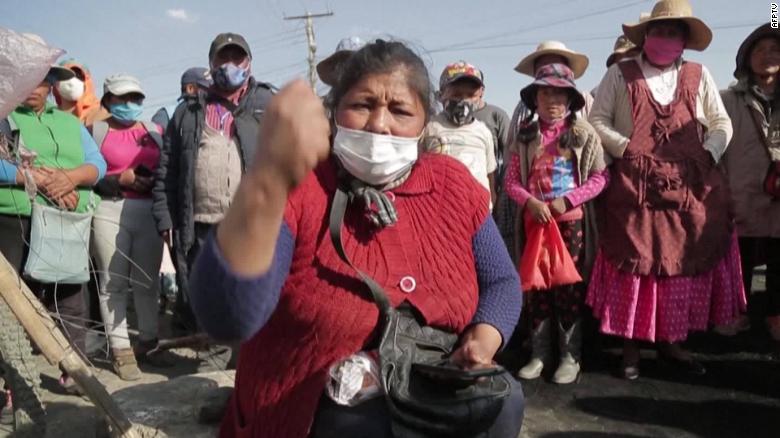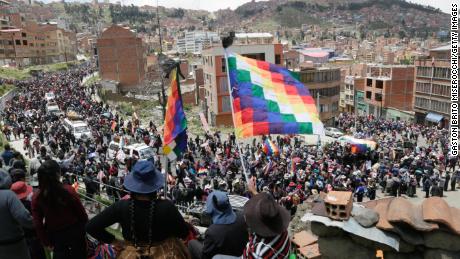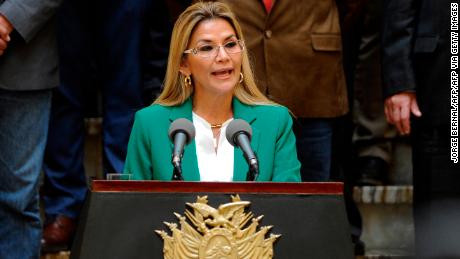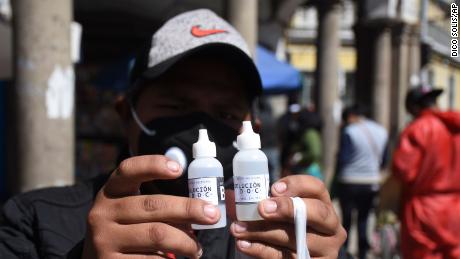(CNN)It started with allegations of fraud amid contested national elections. Then came claims of a coup. An incumbent president was exiled, protests paralyzed the country, and an economy that had been a Latin American success story showed serious signs of decline.
And that was all before Bolivia's Covid-19 outbreak became one of the worst in the world.
Now, after multiple postponements, Bolivians will finally vote Sunday to choose a new president, vice president, and Legislative Assembly.
It is a contest that many hoped would have laid last year's recriminations to rest, but in reality, could further divide an already splintered country.
In the crowded race for president, two men lead the pack -- frontrunner Luis Arce, a socialist former finance minister, and the more centrist former President Carlos Mesa.
Whoever wins will inherit debilitating protests, a beleaguered public health system, and an economy mired in recession.
Let's take a look at how we got to this point and what might happen next.
Election chaos
When Bolivians went to the polls in October 2019, few were prepared for the bloodshed that would follow.
It was clear the contest would come down to two candidates: long-time incumbent President Evo Morales and former President Carlos Mesa.
Morales, the country's larger-than-life, first indigenous president, had been credited for a years-long effort to lower poverty and grow the economy, spearheading a campaign to nationalize certain industries that delivered positive results.
But criticism grew as his third term ended; Morales was increasingly the target of corruption allegations and was only able to run again in 2019 after a controversial Supreme Court decision eliminated term limits.
Mesa himself has never actually been elected president. In 2003, he was serving as vice president when then President Gonzalo S├Īnchez de Lozada resigned following massive protests.
Mesa took over and lasted less than two years before also resigning amid protests. In his 2019 bid to return to the highest office, the former journalist sought to appeal to the center of a polarized electorate.
Preliminary results were released the evening of October 20, showing Morales with a slight lead over Mesa, but not enough to avoid a runoff election under Bolivian elections rules: Candidates need 50% of the vote, or at least 40% and a 10-point lead, to avoid a second round of voting.
Morales didn't appear to have either, at first.
But that night, the vote count unexpectedly halted. When it resumed about 24 hours later, Morales' modest lead surged, putting him across the threshold to avoid a runoff. He claimed victory a few days later, but Mesa refused to concede, citing a flawed vote count. Many decried the election results as fraudulent.
An Organization of American States (OAS) election audit released a few weeks later claimed there was "intentional manipulation" and "serious irregularities" in the vote count. The audit would soon come under severe scrutiny, but its effect was immediate.
The influential hemispheric body said it wouldn't certify the results of the election, further fueling critics' demand for Morales to step down.
Protests broke out across the country both for and against Morales and would continue for weeks. Dozens would eventually die in the ensuing violence.
Amid public pressure and a call from the commander of the country's military forces to step down, Morales fled Bolivia. He remains in exile.
The fall-out
Amid the post-election chaos and Morales' departure, right-wing opposition lawmaker Jeanine A├▒ez declared herself interim president in November 2019, despite the absence of a legislative quorum to appoint her.
She promised swift new elections, but a year later, those elections are only just now happening after a series of broken promises.
Despite first offering to hold elections within 90 days of ascending to power, A├▒ez scheduled them for May, more than two months later than her initial offer. Then, soon after Bolivia announced its first confirmed case of the coronavirus March 10, the elections were put on indefinite hold.
A├▒ez cited public health concerns for the delay but it set the stage for further tensions with critics who say her administration has cracked down on political opponents, botched its handling of the coronavirus pandemic, and clung improperly to power.
Shortly after taking office, the A├▒ez administration was swiftly accused of brutally suppressing protesters and of racism against indigenous groups who overwhelmingly support the Movement for Socialism (MAS), the party once led by former President Evo Morales.
Harvard's International Human Rights Clinic said in a late 2019 report that, "...restrictions on free speech, and arbitrary detentions have all contributed to a climate of fear and misinformation" under A├▒ez.
And the OAS audit that helped push Morales out of power has since repeatedly been called into question. The Center for Economic and Policy Research, a left-leaning US think tank, released a lengthy report claiming OAS' claims of electoral fraud were unfounded and detrimental, saying, "...the OAS opted for a political intervention over a technical intervention."
A group of two dozen US lawmakers led by Senator Bernie Sanders also sent a recent letter to US Secretary of State Mike Pompeo calling for a review of the OAS regarding "...its actions last November that contributed to a major deterioration of human rights and democracy in Bolivia."
OAS has fiercely defended its election audit, including issuing a 3,200-word press release in June responding to its critics in detail. According to the statement, "the evidence collected leaves no room for doubt about the electoral fraud perpetrated."
Throughout A├▒ez's tumultuous reign, Bolivia's response to the coronavirus has at best been piecemeal and at worst, disastrous.
The country has one of the highest coronavirus death rates per 100,000 people in the world, trailing only two other major countries. A├▒ez herself contracted the virus, along with roughly a dozen members of her senior cabinet.
Her health minister was arrested in May on suspicion of corruption involving the purchase of ventilators.
Over the summer, the country's legislature even passed legislation that would allow people to ingest chlorine dioxide as a coronavirus treatment -- a toxic cleaning agent Bolivia's own health ministry says can have life threatening effects.
The calamitous series of events have sparked protest after protest against the government.
When A├▒ez again postponed the national vote from September 6 to this weekend, thousands of protesters set up dozens of roadblocks, crippling cities like La Paz.
But with ballots being cast this weekend, the country may finally be at an inflection point.
The elections have arrived
Once again, former president Carlos Mesa is facing off against a member of the MAS party: Luis Arce, Morales' former finance minister and handpicked successor. A number of other candidates are likely to garner small shares of the vote, but it is basically a two-man race. A├▒ez herself dropped out of the race a few weeks ago, saying she hoped to help consolidate voters against Arce.
Though polling has consistently positioned Arce as the frontrunner, at this point it's unclear if he has enough votes to avoid a runoff. If Arce fails to cross the threshold, a second round of voting provisionally slated for November 29 would surely add to existing tensions. All sides are on high alert for any signs of fraud.
Should voters identify any such signs, or should one or more candidates declare the results of the election invalid, it could set off a protracted post-election fight and do long-term damage to the perceived legitimacy of Bolivia's democratic institutions.
Whatever the outcome, protests are widely expected. The US Embassy in La Paz recently issued a security alert warning its citizens of the potential for violence, and shortages of groceries and gas. In the long-term, the next president will face a fiercely partisan mood in the country and a potentially divided government.
Fueling any unrest will be ongoing economic pain. Unemployment has spiked since the pandemic began, the International Monetary Fund is predicting a nearly 8% drop in GDP this year, and last month, US credit ratings agency Moody's downgraded Bolivia's standing.
Put another way, disputes over the election's outcome might only be the beginning of the next president's problems. Bolivia's myriad troubles almost assuredly will not be limited to just the past year.








